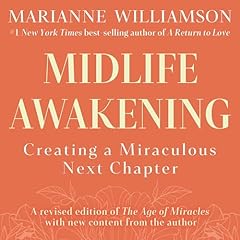
Midlife
A Philosophical Guide
No se pudo agregar al carrito
Add to Cart failed.
Error al Agregar a Lista de Deseos.
Error al eliminar de la lista de deseos.
Error al añadir a tu biblioteca
Error al seguir el podcast
Error al dejar de seguir el podcast
 Exclusivo para miembros Prime: ¿Nuevo en Audible? Obtén 2 audiolibros gratis con tu prueba.
Exclusivo para miembros Prime: ¿Nuevo en Audible? Obtén 2 audiolibros gratis con tu prueba.Compra ahora por $14.66
-
Narrado por:
-
Stephen R. Thorne
-
De:
-
Kieran Setiya
Philosophical wisdom and practical advice for overcoming the problems of middle age.
How can you reconcile yourself with the lives you will never lead, with possibilities foreclosed, and with nostalgia for lost youth? How can you accept the failings of the past, the sense of futility in the tasks that consume the present, and the prospect of death that blights the future? In this self-help book with a difference, Kieran Setiya confronts the inevitable challenges of adulthood and middle age, showing how philosophy can help you thrive.
You will learn why missing out might be a good thing, how options are overrated, and when you should be glad you made a mistake. You will be introduced to philosophical consolations for mortality. And you will learn what it would mean to live in the present, how it could solve your midlife crisis, and why meditation helps.
Ranging from Aristotle, Schopenhauer, and John Stuart Mill to Virginia Woolf and Simone de Beauvoir, as well as drawing on Setiya's own experience, Midlife combines imaginative ideas, surprising insights, and practical advice. Writing with wisdom and wit, Setiya makes a wry but passionate case for philosophy as a guide to life.
©2017 Princeton University Press (P)2018 TantorLos oyentes también disfrutaron:




















Reseñas de la Crítica
Las personas que vieron esto también vieron:










Academic, tedious, with a few insights
Se ha producido un error. Vuelve a intentarlo dentro de unos minutos.
the last chapters are really great
Se ha producido un error. Vuelve a intentarlo dentro de unos minutos.
Good message, a bit dense
Se ha producido un error. Vuelve a intentarlo dentro de unos minutos.
Midlife: A Crisis or Life
Se ha producido un error. Vuelve a intentarlo dentro de unos minutos.
Where he goes wrong is his use of the poor translation of Sunyata (often translated incorrectly as no self because there's no direct translation). Instead, the meaning is closer to there is no independent self. Thich Naht Hahn was one of the best writers and speakers on this topic. You are interdependent of all the conditions of culture, history, nature, and every other person on the planet. Those conditions are ever changing. If you attach to the idea of permanence, that is why you suffer. No well practiced Buddhist who has spent a lot of time on the cushion will tell you that the goal is to avoid all attachment. Even Allen Watts, whom he briefly references tells a story where the Buddha correctly taught his monks that getting rid of attachment is just another attachment. So again, this author fundamentally misunderstands the Buddhist project.
I've been a practicing Buddhist for 9 years. I've been reading Buddhist philosophy and mediating across traditions for 20 years. To truly understand the meaning of Sunyata requires thousands of hours of consistent meditation. One can know it's meaning but internalized wisdom takes years. Most Buddhist teachers will tell you 10 years of daily practice for a glimpse for most and 20 for understanding.
This author falls into the same trap as virtually every other philosopher of the west since the Greeks. They look entirely to the individual for answers. This is why, halfway through undergrad, I abandoned as much of western philosophy as I could (though grad school is impossible without it, so I read plenty there) and switched to the philosophy of Asia from India, to China, to Japan.
I'm about to turn 40. While I've had plenty of crisis, I can't say I've ever had a midlife one. Maybe it's because since I turned 31 I've been working with my mind. Maybe it's because my life as an Adjunct professor of Anthropology has been a precarious one, but in either case, this book misses the mark.
With all that said. It's still worth reading, especially if you have no interest in dedication to a contemplative practice.
Incomplete
Se ha producido un error. Vuelve a intentarlo dentro de unos minutos.


